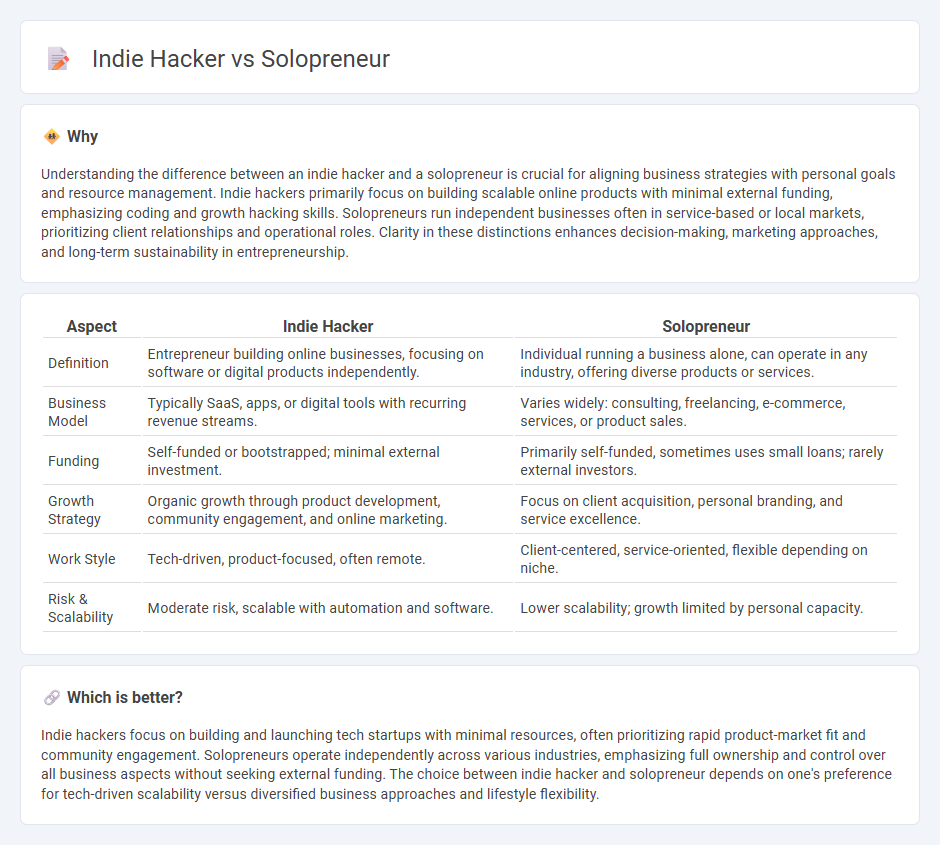
Indie hackers focus on building scalable, software-based businesses with minimal external funding, leveraging online communities and lean startup principles. Solopreneurs operate independently across various industries, managing all aspects of their businesses from marketing to sales without co-founders or employees. Discover the key differences and advantages of each path to choose the best fit for your entrepreneurial journey.
Why it is important
Understanding the difference between an indie hacker and a solopreneur is crucial for aligning business strategies with personal goals and resource management. Indie hackers primarily focus on building scalable online products with minimal external funding, emphasizing coding and growth hacking skills. Solopreneurs run independent businesses often in service-based or local markets, prioritizing client relationships and operational roles. Clarity in these distinctions enhances decision-making, marketing approaches, and long-term sustainability in entrepreneurship.
Comparison Table
| Aspect | Indie Hacker | Solopreneur |
|---|---|---|
| Definition | Entrepreneur building online businesses, focusing on software or digital products independently. | Individual running a business alone, can operate in any industry, offering diverse products or services. |
| Business Model | Typically SaaS, apps, or digital tools with recurring revenue streams. | Varies widely: consulting, freelancing, e-commerce, services, or product sales. |
| Funding | Self-funded or bootstrapped; minimal external investment. | Primarily self-funded, sometimes uses small loans; rarely external investors. |
| Growth Strategy | Organic growth through product development, community engagement, and online marketing. | Focus on client acquisition, personal branding, and service excellence. |
| Work Style | Tech-driven, product-focused, often remote. | Client-centered, service-oriented, flexible depending on niche. |
| Risk & Scalability | Moderate risk, scalable with automation and software. | Lower scalability; growth limited by personal capacity. |
Which is better?
Indie hackers focus on building and launching tech startups with minimal resources, often prioritizing rapid product-market fit and community engagement. Solopreneurs operate independently across various industries, emphasizing full ownership and control over all business aspects without seeking external funding. The choice between indie hacker and solopreneur depends on one's preference for tech-driven scalability versus diversified business approaches and lifestyle flexibility.
Connection
Indie hackers and solopreneurs share a fundamental focus on independent business creation, leveraging technology and digital platforms to build scalable ventures without traditional corporate structures. Both prioritize direct customer engagement, rapid iteration, and lean operations, often relying on self-funded or minimal external investment. This alignment fosters a community-driven mindset where resourcefulness and personal accountability drive sustainable entrepreneurial success.
Key Terms
Autonomy
Solopreneurs prioritize complete autonomy by managing every aspect of their business independently, seeking full control over decision-making and operations. Indie hackers balance autonomy with community support, leveraging collaborative feedback while maintaining ownership of their projects. Explore the key distinctions in autonomy to determine which approach aligns best with your entrepreneurial goals.
Product Ownership
Solopreneurs typically manage all aspects of their business solo, with primary responsibility for product ownership, development, marketing, and customer relations. Indie hackers prioritize creating scalable digital products, often leveraging lean startup methodologies to validate ideas and iterate quickly without external funding. Discover more about how these approaches impact product ownership and business growth.
Scalability
Solopreneurs typically prioritize steady, manageable growth by leveraging personal expertise and minimal resources, fostering sustainable business models without rapid scale pressures. Indie hackers emphasize scalable ventures, using technology and automation to rapidly increase revenue and user base, often aiming for exponential growth through innovative digital products. Explore how these approaches impact your business scalability and long-term success.
Source and External Links
What Is a Solopreneur? | CO - A solopreneur is an individual who builds and runs their business alone, taking full responsibility for its success or failure, often enjoying high control but facing challenges like managing everything solo and possible loneliness.
Solopreneurs vs. Entrepreneurs vs. Freelancers: What is a Solopreneur? - A solopreneur is the sole employee and owner of a business, managing all aspects independently and distinct from entrepreneurs who may lead teams or have partners.
Self-Employed Accounting Software for Solopreneurs - QuickBooks Solopreneur offers a comprehensive platform tailored for solo business owners to manage bookkeeping, tax preparation, invoicing, payments, and expenses efficiently.
 dowidth.com
dowidth.com